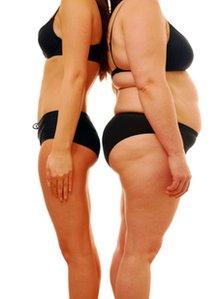Should we stop calling people 'overweight'?
- Published
- comments

An MPs' report on body image has advocated the use of "weight-neutral language". So should we stop calling people "overweight"?
There are many people who would agree that using the term "fat" to somebody's face is neither helpful or pleasant.
But there's a growing movement to get doctors and other public health professionals to stop using words such as "overweight" and "obese" as well.
MPs think the terms have a negative impact on body image and self-esteem, and want doctors to promote broader health and lifestyle messages instead.
The idea has been gaining momentum for a while. A study by the University of Pennsylvania in January found the word "obesity" offensive, while Liverpool City Council considered banning the word in its <link> <caption>literature aimed at children</caption> <url href="http://news.bbc.co.uk/1/hi/england/merseyside/8615839.stm" platform="highweb"/> </link> in 2010.
And in March, draft guidance issued by the National Institute for Health and Clinical Excellence said those who were obese should merely be encouraged to get down to a " <link> <caption>healthier weight</caption> <url href="http://www.telegraph.co.uk/health/healthnews/9252311/Obesity-a-derogatory-word-says-Nice.html" platform="highweb"/> </link> ".
But not everyone agrees. In 2010, the Public Health Minister for England, Anne Milton, said <link> <caption>GPs should tell people they were fat</caption> <url href="http://www.bbc.co.uk/news/uk-10789553" platform="highweb"/> </link> rather than obese as it was more likely to motivate them into losing weight.

Somebody with a BMI of 30 or more is classed as obese
So does weight terminology need a rethink?
Dr Sarah Jarvis, a presenter on the BBC's One Show, says when it comes to a medical context, the words "overweight" and "obese" are necessary, largely because they are the framework for the body mass index (BMI).
"I don't want to make people feel bad, and appreciate some people may have problems with self-esteem, but when it comes to it, as a doctor, if you are too careful, you run the risk of people not understanding the health implications.
"The fact is BMI is the best indicator of likelihood of surviving to a later date - and if you get into the obese range, the chances are you are going to die from a condition related to obesity like heart disease. If you are overweight rather than obese, you are more likely to die early and have medical conditions," she says.
Jarvis says there are occasions when she chooses her language carefully, for example by never encouraging people to go on a diet - "as 90% of people that lose weight on a diet will put it, and more, back on within a year" - but to adopt a lifestyle instead.
But she says although she would never use the word fat in her surgery, as it has "childhood playground associations", she thinks talk of banning overweight is "political correctness gone mad".
"I do see how it is a delicate balancing act - on the one hand I don't want to be pejorative, or be mean, but at the same time the pendulum must not swing too far the other way.
"The facts are when I started training in 1993, 10% of the UK was obese and now 25% are. We are absolutely not moving the goalposts - we are getting fatter," she says.
Nigel Mercer, the president of the British Association of Aesthetic Plastic Surgeons, agrees that when it comes to someone who is seriously overweight, and it is a medical issue, "there is no pussyfooting around the issue".
But he says the key is "appropriate use of terminology for appropriate use".
"It depends on who comments are being levelled at - to a class of children, where there will be a distribution of body sizes, it is important to know being overweight can lead to diabetes, but it is more of a psychological issue than a health issue - and children can be extremely cruel," he says.
Mercer says for adults, part of the problem is people no longer filter what they say, and society should really keep more of its opinions to itself.
"I am a big bloke, and I would have no problem if a professional told me I was obese, but it would be entirely different if someone told me that in the street," he says.
Elsewhere on the web
The BBC News Magazine previously explored <link> <caption>size-based discrimination</caption> <url href="http://news.bbc.co.uk/1/hi/magazine/8327753.stm" platform="highweb"/> </link> , hearing from 22 stone (139kg) businesswoman Marsha Coupe, who believed "fattism" fuelled an attack on her.
In the article, Susie Orbach, psychologist and author of Fat is a Feminist Issue, maintains that this kind of prejudice stems from the idea that overweight people have lost their self-control - which frightens society because there is so much emphasis on being slim.
Orbach has also written on the subject of "fattism" more recently <link> <caption>for the Guardian</caption> <url href="http://www.guardian.co.uk/commentisfree/2012/may/03/fat-prejudice-issue" platform="highweb"/> </link> , pointing towards a new study highlighting levels of <link> <caption>discrimination towards fat people at work</caption> <url href="http://www.manchester.ac.uk/aboutus/news/display/?id=8224" platform="highweb"/> </link> , and the trend for " <link> <caption>fat shaming</caption> <url href="http://blog.sfgate.com/sfmoms/2012/01/04/georgia-childhood-obesity-campagin-stirs-up-controversy/" platform="highweb"/> </link> ".
<link> <caption>An article in Psychologies magazine</caption> <url href="http://www.psychologies.co.uk/body/the-price-of-beauty.html" platform="highweb"/> </link> asks whether an increasingly homogenised ideal of beauty and the "female power to transform" are damaging people's relationships with their true selves.
But Tara Parker-Pope, in a blog for the New York Times, nods to research that suggests people aren't always so alert to their body size, entering into a collective state of <link> <caption>"fat denial"</caption> <url href="http://well.blogs.nytimes.com/2012/04/18/are-most-people-in-denial-about-their-weight/" platform="highweb"/> </link> , often underestimating their size.